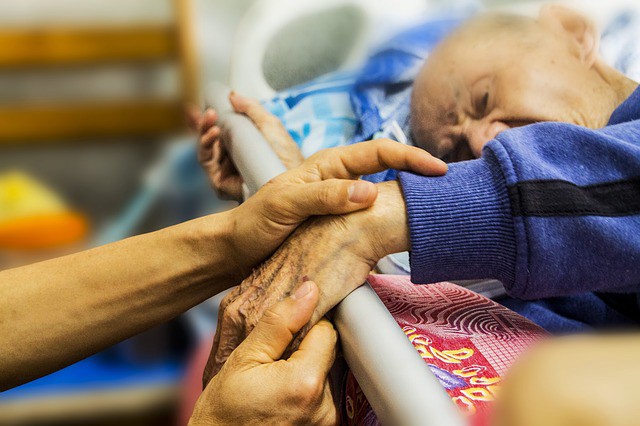When a loved one is nearing the end of their life, caregivers are faced with a barrage of responsibilities.
Tom Paquette, a social worker with the Visiting Nurse Association of Chittenden & Grand Isle Counties, said caregivers can get caught up in the practical tasks that come with the end of a life. But taking the time to nurture your relationship with your loved one can be a critical part of the process.
“It’s easy to focus on that and not focus on that person leaving you and how you are going to have this closure with this person,” Paquette said. “So just trying to maintain a relationship with a person given that you know they’re going to be dying, that’s incredibly important.”
Tara Graham, executive director of the VNA Hospice & Palliative Care Program, said knowing in advance that a loved one is dying gives people the luxury of time.
“Even if it’s a matter of a couple months, you have the opportunity to really acknowledge someone and express your gratitude for them, but also learn what they feel is important and what sort of things they find most valuable in their own life,” she said.
“For a lot of people, it can be a really tender time,” Paquette added. “You talk about what that person meant to you and vice versa. Some really rich conversations happen.”
Vermont experts in the field of dying and end-of-life care offered several suggestions for nurturing relationships with loved ones as they near the end of their lives.
Start Now
The experts all stressed the importance of starting early—why wait until the last stages of life to tell someone how important they are to you?
Nina Thompson is the executive director of Wake Up to Dying, an awareness project that asks Vermonters, “What would happen if we paid more attention to the fact that we die?” Thompson said her work encourages people to “hold this truth on a regular basis,” she said. “I’m not suggesting a death grip on this truth, but hold it lightly and contemplate it from time to time. Really know it and let it inform the way you live your life.”
Thompson said when we take the time to contemplate the fact that we all die, it changes the way we live. Maybe we are more compassionate, or we change careers, or choose to spend our time differently. Often, it means we express how much we love those closest to us, she said.
“I suggest that we have to have those relationships all along,” Thompson said. “If you wait until the midnight hour when death feels imminent, there are high emotions, high fear, high confusion. That is a hard time to say all the things you should have been saying all along.”
Graham also said it’s important “to have those conversations sooner rather than later. As you get nearer the end of someone’s life, it gets complicated and it’s just hard,” she said.
That advice can apply to all our relationships—not just those with loved ones near the end of their lives.
“A question we should all ask ourselves is, ‘If this person dies tomorrow, are there things we should have said to them?’” Paquette said.
Even at the end of life, though, sooner is better, Thompson said.
“It’s really never too late to say stuff,” Thompson said. “In end-of-life coaching, one of the things we always hit on is, ‘What still needs to be said?’ We encourage people to find an opportunity to say it,” Thompson said. “Ask for forgiveness, forgive people, let people know you have forgiven them and really, sincerely try to forgive them. Those are really important things.”
She cautioned that sometimes an illness can progress more quickly than families anticipate.
“Families say, ‘We didn’t say what we wanted to say. We kind of thought we had a little more time,’” Thompson said. “You have to say it. Don’t wait.”
Paquette also said not to delay.
“People always think they have more time than they do and they don’t have those conversations,” he said.
Get It All Out
Paquette said some conversations can be difficult or even unpleasant, but it’s important to get closure—which can affect how people grieve later.
“Sometimes, people will shy away from talking about things they need resolutions on, things that have bothered them,” he said. “There can be an element of forgiveness that needs to happen. Sometimes people need to bring up anger to get some resolution. Life is messy, and relationships are tough. Sometimes people regret not having those conversations.”
Graham said you can also gently help your loved one if they need to express something.
“It’s always important to not let things be unsaid,” Graham said. “You can even to give people permission to tell you things they haven’t told anyone, or if there’s something they want to get off their chest.”
Most of the time, though, Paquette said, it’s important to tell the person—often repeatedly—that you love them.
“More often, people really regret not telling the person what they meant to them in the relationship,” he said.
Let Them Lead
“When somebody is dying, you really want it to be person-led,” Thompson said. “You may have your own ideas of what should be said and what you want to hear, but really it’s their deal. It’s their show. Just being present with them and letting it be person-led—the dying person—is the most loving thing you can do.”
“It’s about being acknowledged, but trying to not insert yourself,” Graham said. “That’s really difficult because the relationships we have with other people happen in the space between us. We can’t let go of our connection, but at the same time to we’re just given this lifetime.”
Graham suggested asking your loved one what they found most important in their life, and how they want to be remembered. She said you could also ask what the person might need from you, or what you can do for them.
“For myself, that was helpful to have conversations with my dad about what he enjoyed most and what he’s going to miss,” she said.
Tara said when her father was diagnosed with a terminal illness, she had just learned she was pregnant with a son she would eventually name after her father.
“I wish I had asked my dad what he wished his grandson had known about him,” she said.
Give Yourself Some Leeway
Both Paquette and Graham said people should recognize that they will never be able to do everything.
“There will be never be enough time with the people we love,” Graham said. “There will always be unanswered questions and wishes…. I think we have to be gentle with ourselves and not have high expectations.”
“You’re not going to be able to do everything,” Paquette said. “Some people frantically want everything tied up, everything perfect in the relationship. That’s not reality. We have to forgive the fact that we can’t have closure on everything.”
Graham also said you don’t have to put on a brave face all the time.
“I think it’s OK to cry,” Graham said. “Sometimes people think they can’t or it’s a sign of weakness. It’s OK to be as authentic as possible and real. I think it’s perfectly normal to say how sad you are.”
Get Help
Paquette said hospice volunteers are available to assist with a variety of tasks to help preserve relationships for down the road—taking photos, audio recordings, videos for young children, Skyping with those far away, writing letters. They also have volunteer writers and poets who can help someone share their story.
Thompson also said hospice staff—social workers or chaplains—can help you have conversations that may be difficult, or help you work through what you want to say.
She also suggested getting together with others to talk about death and the dying process.
Just Be Together
Just spending time together—without pressure of getting closure or talking everything over—can be enough.
“The most loving thing you can do is be present for them,” Thompson said.
“The best thing is to be with that person and love them through the experience,” Paquette said. “That’s really the basis of all of this. Listening to what they have to say, being an open conduit. Many things will come up by your presence. It doesn’t have to be some deep, dark thing.”
Graham said she has never known a dying person who didn’t like the company of another person.
“Often, it’s just a matter of sitting and being with someone,” Graham said. “Just enjoy the quality of the time you have with each other.”
 Related Articles & Free Subscription
Related Articles & Free Subscription
Helping Seniors Extend Their Driving Years
Monitoring Solutions for Loved Ones with Dementia
Underutilized Palliative Care Services Can Help Relieve Pain






Comment here